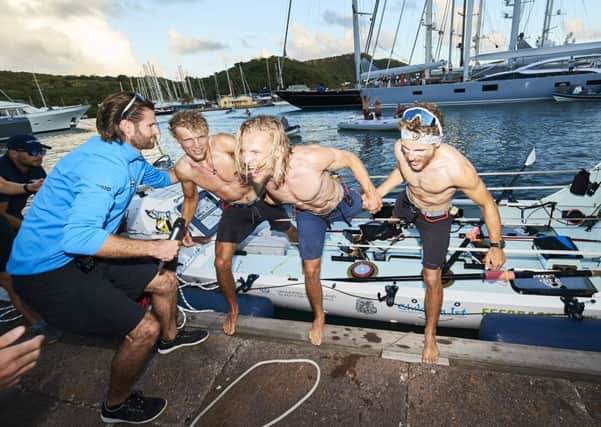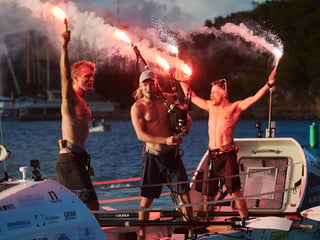Alexander McCall Smith: I must atone for being a Jeremiah about my godson’s heroic feat


Last week three Scottish brothers reached Antigua, having rowed across the Atlantic. The distance they covered was over 3,000 miles, and it took them 35 days to do so. These brothers, Ewan, Jamie, and Lachlan MacLean, are the sons of old friends of mine, and I am godfather to the middle one, Jamie, a student of architecture at Glasgow University. Ewan is a design engineer with a talent for invention, and works for Dyson. Lachlan, the youngest, is a student of philosophy at the University of Glasgow, and is an accomplished player of traditional music on the piano accordion. All three are a credit to Scotland, and of course to their mother and father, who made such a fine job of their upbringing. If they are glowing with pride over their sons, then they are fully entitled to do so.
Look at the photographs of their arrival. There they are, in need of a shave and in urgent need of a shower; not carrying an ounce of extra weight; smiling with pleasure at being back on land; surrounded by friends and well-wishers; a Saltire wrapped over their shoulders. Such photographs tell us a lot about how we still want heroes; why we still like to read about Odysseus and his long sea journey, after all those years. They underline something that we sense exists and yet rarely articulate: the desire for community – the desire that we have to be united in effort and appreciation of achievement.
Advertisement
Hide AdAdvertisement
Hide AdIt is significant that the presence of the Saltire seemed so natural. The English teams completing the race do not seem to be putting much store by the St George’s Cross. That makes one wonder why it is that Scots can celebrate these things as a national achievement, while the English seem reluctant or embarrassed to do so. That involves complex issues of identity, but one might reflect on the possibility that England might envy Scotland’s comfort in its identity, and regret the loss of community that a disappearing flag might signify.
Young men and unusual ideas
I must confess I was extremely concerned about their safety. I was far from keen for them to do it. When they invited me for lunch in Edinburgh some time ago and said that they had an idea to discuss, I was intrigued. But when they announced what this idea was, I was dismayed. Had just one of them said that he was going to row the Atlantic, I would have shrugged and, I suppose, been encouraging. After all, young men are always coming up with unusual ideas about how to pass the time. How many times have young men said they intend to climb Kilimanjaro? That happens to me virtually every day, and sometimes I can even anticipate it, saying “Don’t tell me, it’s Kilimanjaro, isn’t it?”
What worried me was that all three of them were proposing to go together. After all, there is a reason why the royal family doesn’t all travel in the same aeroplane. One does not want to dwell on that issue, but it was enough to make me extremely unenthusiastic.
Of course, it made no difference – and now they have proved that they can do something quite extraordinary. Their crossing involved three world records, and in the context of that, concerns that friends might have had about having all three boys in one boat, in the middle of the Atlantic, rather fade into the background. That there can be no achievement without risk is probably true in many contexts, but particularly so in adventures of this sort.
My penance
Of course if you’re a Jeremiah, you’re a Jeremiah, and it is hard not to think of the dangers – even when the adventure is safely over. Yet once the participants are safely home, we Jeremiahs must openly say how wrong we were. We should also reflect on the nature of their achievement and what it means: that there are still people determined to do something exceptional themselves, rather than sit about and watch other people do it.
As penance for my reservations, I am now planning to row, single-handed, from the mouth of Loch Sunart across the Sound of Mull to Tobermory. This journey will be full of dangers, such as the disturbed water at Auliston Point where quite high waves (two feet at times) can be encountered. I am looking for sponsorship, and if I am successful, I might go on to consider not climbing Kilimanjaro.
That, of course, is the real secret with such fundraising endeavours: get people to sponsor you not to do something. Charity parachute jumps are a case in point. Most of us would pay anything to prevent a member of our family from doing a charity parachute jump. On the other hand, there are some people whom many of us would actively encourage to so such a jump. Some people even have a personal list of that nature.
None of this should detract from the superb achievement of these wonderful young men, and indeed of all the other teams who made that crossing. Don’t try it again though, please, and, yes, I shall be perfectly happy to sponsor you not to do it.
